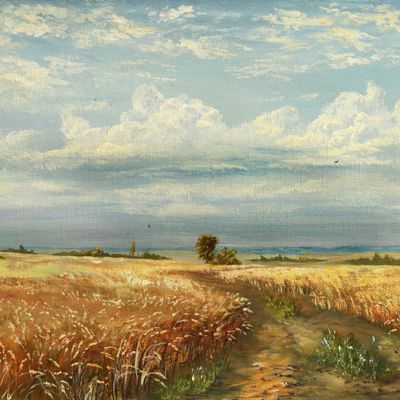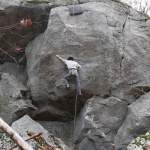
I grew up in Karachi, Pakistan, but have lived in Indiana for more than 20 years. I have gotten degrees and awards here; I have given birth here; I have fallen in love here and argued cases in court here. And yet I still struggle to reconcile the inner reality of my mind with the physical reality around my body. It’s as if I lost connection between where I am and where my mind expected me to be.
It was an arranged marriage that brought me to the United States and eventually to the Midwest. When I decided to leave that marriage two years later, I took refuge in a rural domestic-violence shelter tucked away amid crumbling houses. I faced a custody battle for my daughter, who was barely 2 years old. I won, eventually, but was sentenced to a life in Indiana, where the divorce and custody arrangements were finalized. If I wanted to move more than 100 miles outside the jurisdiction of the court where the case was filed, I would have to go before the judge and ask for permission, which also meant that I could lose custody. So I stayed and made some friends and tried to develop a relationship with cornfields and the bitter cold.
I busied myself with goals I could achieve within those 100 miles. I got a law degree, then decided to pursue a Ph.D. in political philosophy; tended to my daughter; and, after a few years, got married again to someone whose family had lived in the state for several generations and who was as rooted in the place as I was rootless. This frenetic checking of boxes distracted me from the acute sense of alienation, of not feeling properly interwoven with the physical and natural world around me. I knew that the oaks and maples were real, as were the cardinals and blue jays, but some instinctual part of me kept expecting palm trees and cuckoos.
When I arrived in the country as a teenage bride, I was too young to worry that my inner schism would be perpetual. I remember being surprised by the strength of its impact in those first days. I walked around the cookie-cutter apartment complex that was now home, overwhelmed by the depth of a silence that exists only in suburban America. I had come from a noisy place; literally incessant sound that formed a perpetual loop from kids laughing on their way to school, passenger buses whose drivers played little ditties with their horns, the vegetable sellers, the berry sellers, the guy collecting newspapers and bottles for recycling, our neighbors hanging up their laundry. When my grandmother stirred the food in one of our large metal pots with a wooden spoon, I could hear it all the way upstairs, along with the thud of the kitchen’s screen door being opened and shut again and again for the milkman, the garbage man; a constant line-up of the sounds of life.
I filled the silence with the noise of television. The cacophony of talk shows like Jerry Springer filled up the empty air of all the empty apartments where I lived in those early years, the spats over baby daddies and surprise pregnancies becoming routine enough to be almost soothing. Later, when I moved to my house in Indianapolis and had a little more money to afford a satellite dish, I played Pakistani news channels all day long, interspersed with the occasional Bollywood music interlude. My daughter grew up with the theme music to Pakistani newscasts as a familiar sound; she picked up Urdu words and developed a taste for hot and spicy food. I told myself that I was creating a perfect melange of two cultures, Hoosier and Pakistani.
Those easy tricks of playing familiar sounds and busying yourself with the pursuit of degrees or dollars — all are immigrant tactics to regain lost self-worth. As my 30s crept toward my 40s and the total of my years in Indiana became more than the sum of my years in Pakistan, I began to realize this. I had spent a lot of time thinking about the challenges of the young immigrant, the displacement and the homesickness, and assumed that with the passage of time comes some moment when the spliced sapling grafted to another becomes one tree. When I encountered narratives that suggested that the sense of displacement would be forever, as I did when I read Jhumpa Lahiri’s The Namesake — with its wistful, middle-aged Indian mother misinterpreted by her American children — I scoffed. I would never be lost and middle-aged. Some people are just sad people, I would think, blithely in denial and unable to distinguish between the forever unhappy and the forever lonely.
Then, in August 2015, my mother died. I was taking a shower and there was shampoo in my hair when I saw my mother’s face light up my phone screen. I didn’t have to answer to know that she was gone. She had been taken to the hospital in Karachi a few days earlier and had been put on a ventilator. I knew she could not call me. I knew it was over. I don’t know how I managed to get out of the shower or dress myself. I remember only a sudden sense of complete disorientation. Standing in my bedroom, surrounded by the familiar objects of my life, side tables with photographs of the family I had built, books I had read and written, I felt lost, like someone who had suddenly woken from a comatose state to find the world unrecognizable.
This is when I realized that my presence in Indiana would not eventually and automatically make it home. I would never spend a day with my mother that was not rushed by the ticking clock of short immigrant vacations or have tea with my aunts without the anxious echo that wondered whether it was the last time I would see them. I was used to speaking to my mother, seeing her on video calls every day or every other day, the sounds of my past home mixing with the silence of my present. It felt like an amputation. My petty defenses and distractions, the noise of television news and the busyness of building a writing career, leading an international human-rights group, helping with school projects and chauffeuring from here to there felt puerile and pointless.
When the fog of sorrow lifted, I threw myself into a self-styled program of grounding myself in Indiana by engaging more pointedly with my natural environment. I learned the names of the birds and the trees. I swam (or really just floated) in the small lake near where I live. I went to farmers’ markets and filled the house with seasonal vegetables. I lay on the grass in my backyard and stared up at the sky and thought I was making progress. I had lived here for two decades by now, longer than I had lived in Karachi. It was time to let go, and I let go.
Then, earlier this year, my husband of 16 years suddenly confessed to an affair and left the home we had built together. There were no warnings, no suspicious texts, no furtive absences. The affair had been going on for a year, and its details were damning: my car, the bar down the street, dates that had been passed off as office events where spouses were not invited. It was all tawdry and predictable, but it hurt like death. Mere hours earlier, he had said “I love you.” Days earlier he had written down the dates of my doctor’s appointments so he could drive me to them. If I had grown any roots here in the years between my mother’s death and my husband’s betrayal, they were yanked out in one single conversation on one single day.
If the 100-mile custody arrangement for my daughter had been a constraint, my second marriage had been an anchor. With that over, there is nothing keeping me here anymore. My daughter is an adult, and my marriage is over. I can return to Karachi, but I visit often enough to know there will be no deliverance or solace in return. I am haunted by a shadow of myself, one untouched by displacement or loss, a constant parallel that sometimes feels more real than my actual self. I am beginning to realize that a reconciliation between the two may never be possible.
Friends and relatives tell me to embrace the new life that lies ahead of me, and I don’t know how to tell them that an immigrant is already living a new life. The prospect of yet another new life feels exhausting and unwelcome. I do not know where I will live this new new life or whether I will stay or go. Will I love Indiana only if I leave Indiana?
More From This Series
- What to Do When You’re Feeling Lonely
- You’re Never Alone With an Audiobook
- The Lonely Teens of TikTok




